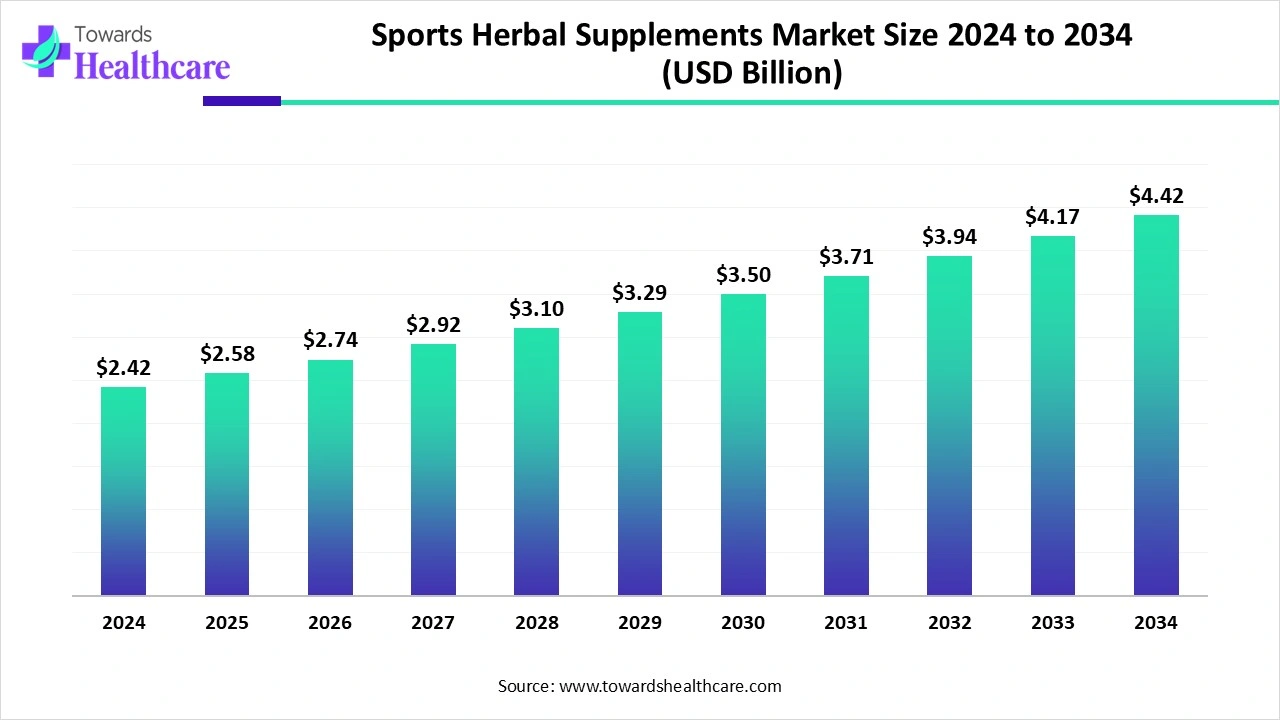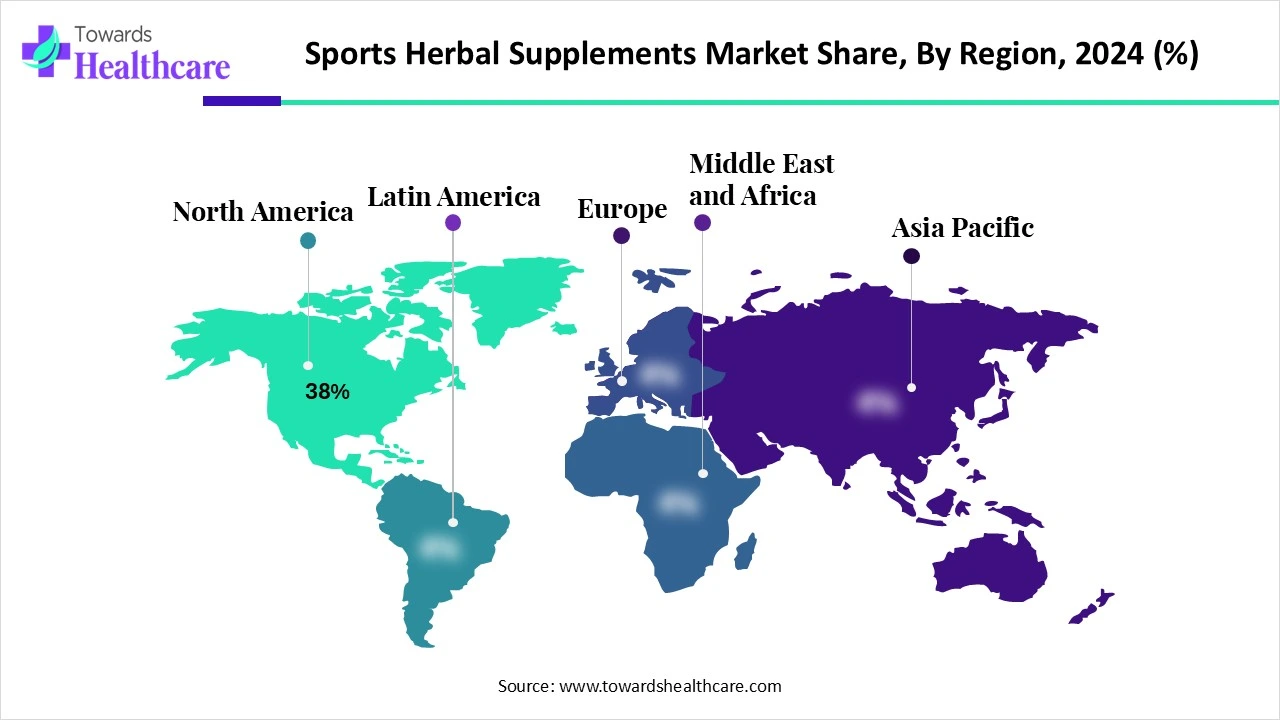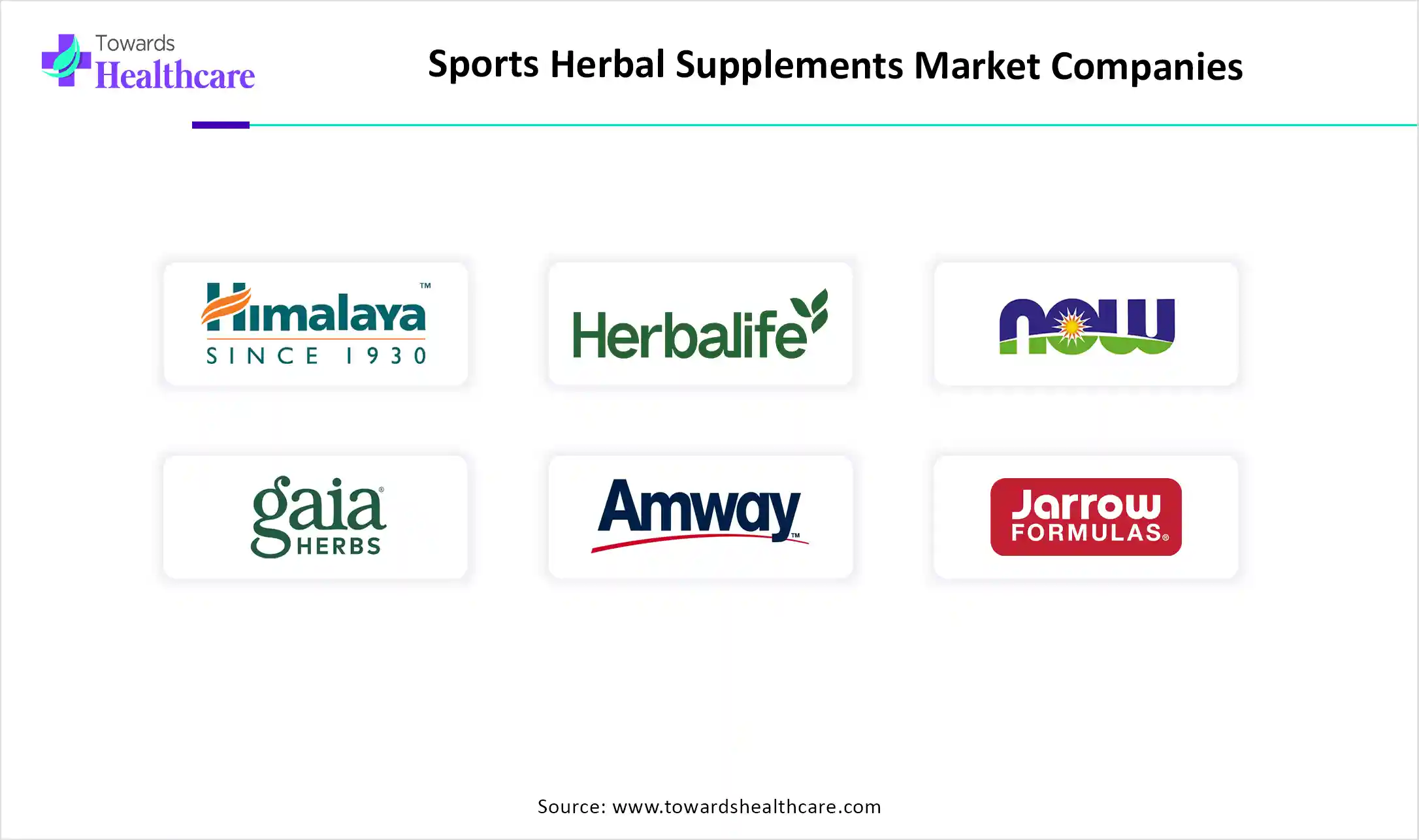January 2026

The global sports herbal supplements market size is estimated at US$ 2.42 billion in 2024, is projected to grow to US$ 2.58 billion in 2025, and is expected to reach around US$ 4.42 billion by 2034. The market is projected to expand at a CAGR of 6.54% between 2025 and 2034.

The sports herbal supplements market is expanding rapidly due to growing awareness of plant-driven and natural products for improving athletic performance, recovery, and endurance. Increasing awareness for without chemical, safe, and sustainable supplements is growing in demand. North America is dominated due to increasing health consciousness and rising fitness centers, while the Asia Pacific is the fastest-growing region with increasing government support and developed retail infrastructure.
| Table | Scope |
| Market Size in 2025 | USD 2.42 Billion |
| Projected Market Size in 2034 | USD 4.42 Billion |
| CAGR (2025 - 2034) | 6.54% |
| Leading Region | North America 38% |
| Market Segmentation | By Product Type, By Formulation, By Distribution Channel, By End User, By Region |
| Top Key Players | Himalaya Wellness, GNC Holdings Inc., Herbalife Nutrition Ltd., NOW Foods, Gaia Herbs, Amway (Nutrilite), Jarrow Formulas, Swanson Health Products, MuscleTech (Iovate Health Sciences), Optimum Nutrition (Glanbia Performance Nutrition), Ancient Nutrition, Kaged Muscle, Organika Health Products, Natreve Wellness, Onnit Labs, Biotropics Malaysia Berhad, Twinlab Consolidation Corporation, Pure Encapsulations, Thorne HealthTech |
The sports herbal supplements market refers to the global industry focused on plant-based dietary supplements designed to enhance athletic performance, endurance, recovery, and overall fitness. Unlike synthetic sports nutrition products, these supplements are derived from natural herbs and botanicals such as ginseng, ashwagandha, maca root, turmeric, green tea extract, and rhodiola. They are consumed by professional athletes, fitness enthusiasts, and recreational users seeking natural alternatives for muscle recovery, stamina improvement, stress reduction, and joint health. Market growth is driven by the rising adoption of clean-label, plant-based supplements, increasing awareness of herbal adaptogens, and consumer demand for safer alternatives to synthetic enhancers.
For Instance,
Increasing the new sports policy and government support for the sport drives the demand for herbal supplements.
For instance,
Growing advancement in next-generation dietary supplements, which contributes to the growth of the market.
For Instance,
Integration of AI in sports herbal supplements drives the growth of the market as AI-driven is transforming the development of products, climbing personalization, enhancing supply chains, and reforming business. Incorporation of AI in sports medicine provides significant potential. AI-driven systems currently lack the nuanced reasoning, intuition, and contextual sympathetic essential for complex clinical decision-making. AI offers significant potential to uplift the sports medicine industry. Its capability to discover and learn existing patterns and generalise to unseen patterns provides significant insights to sports medicine practitioners and complements their decisions. AI-driven algorithms assess the biomechanical data of athletes to forecast injury challenges, provide personalized feedback, and create custom-made rehabilitation programs.
For Instance,
Increasing Trends of Using Ayurvedic Herbs
The integration of Ayurvedic herbs into modern wellness routines is fueling significant growth in the sports herbal supplements market. Rooted in ancient Ayurvedic medicine, these herbs have long been valued for their ability to enhance immunity, improve mental focus, support skin health, and manage various health conditions by addressing the individual holistically - mind, body, and lifestyle. Today, a broad spectrum of herbs, sourced from leaves, roots, flowers, and bark, is being incorporated into sports nutrition products, appealing to consumers seeking natural, plant-based performance solutions. This rising demand for holistic and preventative health strategies is positioning Ayurvedic ingredients as key drivers in the evolving landscape of herbal sports supplements.
Major Challenges of Safety Concerns
The sports herbal supplements market is limit by safety concerns ranging from mild side effects to severe health risks. Disagreements between the FDA, manufacturers, and experts on the interpretation of efficacy and safety data create regulatory uncertainty, limiting consumer belief and limits market expansion.
Recent Advancements in Herbal Supplements
Herbal supplements continue to gain traction within the sports community due to their potential to enhance performance and aid recovery from intense training by providing ergogenic advantages. Broadly available over the counter, popular herbs like ginseng and echinacea are both legal and accessible in many regions, while others face restrictions depending on the country or the governing sports body. Illegality is typically determined when a supplement offers an unfair competitive advantage or poses health risks. This regulatory variability, combined with growing demand for natural performance enhancers, creates a strategic opportunity for innovation and growth in the sports herbal supplements market, particularly in the development of compliant, effective, and safe products.
For Instance,
By product type, the energy & endurance herbal supplements segment led the sports herbal supplements market, as herbal supplements are used to enhance attention and increase stamina in sportspeople with fatigue is present. Herbal supplements demand by the sports community due to their potential for growing performance capacity, also through conferring ergogenic effects.
On the other hand, the muscle recovery & strength segment is projected to experience the fastest CAGR from 2025 to 2034, as many herbal supplements derived from herbs or plants were utilized in sports to boost muscular activities, stamina, muscle recovery, and fat reduction, such as enhancing gym results with the application of ashwagandha. It improves muscle repair, helps with deep sleep, and reduces stress for optimum workout recovery. Supplements for muscle recovery contain protein, vitamin D, creatine, omega-3 fatty acids, branched-chain amino acids, electrolytes, and magnesium.
By formulation, the capsules/tablets segment is dominant in the sports herbal supplements market in 2024, as these capsules/tablets support to boost immunity deprived of adverse effects and are more efficient in offering symptomatic relief, particularly while fighting allergies. Herbs are a totally natural strategy for prevention, curative, and health support. Used in the correct dosage, exclusively prescribed for requirements, they are most safest and efficient way.
The powders segment is projected to grow at the fastest CAGR from 2025 to 2034, as herbal powders are in huge demand. The use of herbs and herbal products is a healthy way to enhance health. This powder provides many advantages, and there are no side effects. It improves skin conditions and encourages overall health. Many herbs are beneficial in managing skin conditions like pimples, rashes, infections, scabs, and bruises. These powders support enhancing mental and physical health.
By distribution channel, the specialty nutrition and sports stores segment led the sports herbal supplements market in 2024, as shopping through specialty stores provides many benefits, including access to particular expertise, a broad range of high-quality products, targeted consumer service, and an immersive shopping experience tailored to specific interests. Specialty stores are called for their expertise in a specific product. The essence of providing a wide range of products rather than catering to possible requirements.
The online retail and e-commerce segment is projected to experience the fastest CAGR from 2025 to 2034, as online sports supplements are advantageous for sportspersons to balance the nutritional diet they take by lowering the shortage of crucial nutrients and strengthening the complete potential of the body. They offer important nutrients to the body, which support weight management, act as an energy source, and lower stress and anxiety.
By end user, the professional athletes segment led the sports herbal supplements market in 2024, as herbal supplements are presently used by athletes to enhance stamina and increase performance. Herbal supplements are used to enhance attention, grow endurance in scenarios where fatigue is present, lower the number of stress-associated diseases and damage in the body, and enhance physical stamina, strength, and energy levels.
On the other hand, the older adults segment is projected to experience the fastest CAGR from 2025 to 2034, as the increasing prevalence of chronic diseases in older adults is high, and they use herbal drugs instead of, or together with, traditional medicine. Most of the aging people use herbal supplements together with conventional medicines are beneficial for them aging people. Elderly people believed that herbal products reduce costs, cure diseases, symptoms, and offer good health.

North America is dominant in the sports herbal supplements market share 38% in 2024, due to the growing customer focus on health and fitness, the rising popularity of outdoor and recreational sports, and the increase in athleisure wear, which drives the growth of the market. A growing aging population commonly uses herbal supplements. This population holds an increasing incidence of chronic disease, which requires the use of progressively advanced drug therapy, which contributes to the growth of the market
For Instance,
Sports herbal supplements are growing in popularity in the United States. This sector continues to grow, with a presence being established for commercially driven herbal products in community pharmacies throughout the nation. Advanced medications in the United States have their foundations in natural sources, which drives the growth of the market.
In Canada, increasing government support for the adoption of herbal medicine, such as Health Canada, regulates natural health products (NHPs) so that Canadians which have confidence that the herbs they use are harmless, efficient, and of high quality. Improved life expectancy and high expenses of pharmaceutical and medical care led to the application of herbal products, which drives the growth of the market.
Asia Pacific is the fastest-growing region in the market in the forecast period, as growing consumer inclination to natural and organic healthcare services, increasing consciousness related to the side effects of synthetic drugs, and an increasing focus on defensive health measures. Increasing health awareness, such as growing interest in herbal remedies, fitness, and preventive health, is driving the herbal-driven sports supplements.
For Instance,
In R&D, technology involves various processes such as product development and formulation standardization, which provide services to the whole nutraceutical, protein supplements, and ayurvedic products.
Key Players: Herbalife Nutrition, Amway, and Glanbia
Clinical trials for sports herbal products involve the testing of these products on people to regulate their efficacy, safety, and possible adverse effects. The aim of a clinical trial is to collect scientific evidence that supports the use of herbal products for healthcare purposes.
Key Players: Herbalife, Glanbia, and Amway
Herbal supplements are supportive in improving the immune system of athletes, improving circulatory health, and improving blood flow, therefore offering athletes more oxygen and exerting an important influence on the regulation of the 3000 m hurdles piece of cardiovascular muscles.
Key Players: Herbalife and Himalaya

In July 2025, Christian Jegen, CEO/President, PEZ Candy, Inc., stated, “We have been working closely with the VMI team to develop a great-tasting line of sports nutrition products, and these PEZ-inspired flavors will not disappoint. We are excited to build out this line with VMI.”
By Product Type
By Formulation
By Distribution Channel
By End User
By Region
January 2026
November 2025
November 2025
November 2025